President Barack Obama has ordered federal agencies to take aggressive steps in response to what the U.S. government is now calling an oil spill of national significance in the Gulf of Mexico. The president dispatched key officials to the Gulf region and directed the use of every available government resource to assist containment and clean up efforts.
The president, who earlier telephoned the governors of five U.S. Gulf states impacted by the spill, spoke briefly before a White House event honoring U.S. school teachers to underscore his commitment to finding out why the Deepwater Horizon oil rig exploded and sank, and taking steps to deal with the aftermath.
"My administration will continue to use every single available resource at our disposal, including potential the Department of Defense, to address the incident," said President Obama.
British Petroleum which operated the oil rig, is legally responsible for bringing resources to bear in sealing the leak and cleaning up the spill. The oil platform exploded, and then sank a week ago, with the presumed loss of 11 workers.
Briefing reporters, Homeland Security Secretary Janet Napolitano, joined by among others the heads of the Environmental Protection Agency and the Coast Guard, said two command centers in the Gulf region are helping to oversee efforts.
Napolitano, who is going to the Gulf with other officials, made clear the government which earlier announced an investigation is determined to get to the bottom of the explosion that preceded the oil leak.
"Our visit to Louisiana and the affected areas tomorrow will also help inform our investigation into the causes of this explosion which left 11 workers missing, three critically injured, in addition to the ongoing oil spill," said Janet Napolitano.
Rear Admiral of the U.S. Coast Guard, Sally Brice O'Hare, said while the situation has not yet been assessed as being on the level of the Exxon Valdez disaster off the Alaskan coast in 1989, the government is fully mobilized and planning for a possible worst case scenario.
"We are being very aggressive and we are prepared for the worst case," said Sally Brice O'Hare. "That is why we have mobilized in the numbers that we have and worked out a plan that is as large and broad sweeping as the one that is in the place looking at the four states with likely impacts."
It's estimated that 795,000 liters of oil are leaking into the sea each day from the damaged well. O'Hare said the trajectory of the spill has oil reaching landfall in the Mississippi delta region at some point on Friday. Steps now underway include ocean skimming operations, and solutions include drilling of a relief well.
However, responding to a reporter's question about how long that might take, Department of the Interior Deputy Secretary David Hayes acknowledged it may take as long as three months for a relief well to be completed.
"This particular well took 90 days to drill, the one the accident occurred on, so we're just estimating that it could take up to another 90 days to put the relief well in," said David Hayes.
The White House is being cautious responding to questions about any impact the Gulf oil spill could have on President Obama's decision earlier this year to expand offshore oil drilling as a way to increase the nation's domestic supply.
For now, said White House environmental adviser Carol Browner, the focus is on dealing with the Gulf incident, but added that everything will have to be taken into account as the offshore drilling plan moves forward.
"We need to stay focused on the incident, we need to learn from the incident, we need to take that information and as the process for the five year OCS [Outer Continental Shelf] plan, public hearings, etc unfolds, that all needs to be folded in," said Carol Browner.
Saying everything is on the table Deputy Secretary of the Interior David Hayes noted the administration would be meeting with oil industry representatives on Thursday and will be announcing additional short-term steps in coming days.
President Obama is also facing some pressure from at least one Gulf State lawmaker in the U.S. Congress. In a letter to the president, Florida Democrat Senator Bill Nelson said questions about oil industry practices in the wake of the incident require that he postpone indefinitely plans for expanded offshore drilling.
With concern mounting about the effects of oil hitting shoreline areas in the Gulf, Louisiana Governor Bobby Jindal declared a State of Emergency on Thursday, saying the spill threatens land, water, fish, fowl and wildlife and will have an economic impact on Louisiana's citizens.












